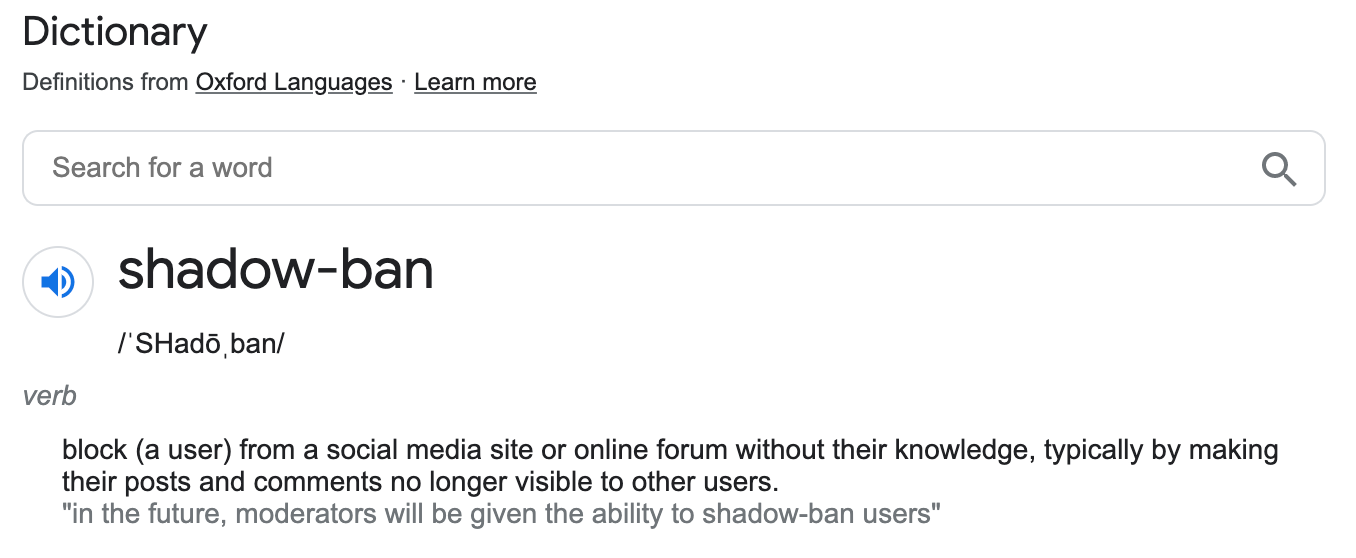
THIS ARTICLE MIGHT GET US SHADOW-BANNED
PAPILLON BOND & JOY MOLAN
08/03/2022
Conversations around the menopause are finally changing. But there's more to be done, argue Papillon Bond and Joy Molan.
Back in 2017, two female medical professionals posted an ad on Facebook promoting a Q&A: Understand menopause, your questions answered. The advert was promptly removed by the social media platform for promoting “adult content”. One of the women involved responded: “It would seem menopause really is the last taboo for Facebook, and I'm disgusted by their response to what is an important subject.”
Five years on, menopause related products and services continue to be banned or “shadow banned” from social media.
If we needed tangible proof that the menopause is still stigmatised in the UK, this is it.
More than half the population has or will experience menopause. And yet it’s overlooked, undermined and misunderstood by policy makers, brands and even health professionals.
Only last year, 41% of UK medical schools were found to not have mandatory menopause education as part of the curriculum. It’s no wonder people experiencing menopause who are seeking medical treatment say it is like “going into battle” to be taken seriously by their GP. People are sometimes misprescribed antidepressants and, with the misinformation from the HRT scandal persisting, millions suffer debilitating symptoms with no relief nor support.
Our lack of education breeds a culture of silence, shame and stigma, which ultimately affects the way people report and experience their symptoms.
But it doesn’t have to be this way.
In 2021, Davina McCall made waves when she announced on her national broadcast documentary Sex, Myths and the Menopause that she was menopausal – and proud of it. Something once hidden behind closed doors and treated as an embarrassing secret, was for the first time being owned publicly by one of the UK’s most recognisable women.
Finally, brands are starting to wake up to this inevitable lifestage and the opportunities to break down cultural barriers. Holland and Barrett’s award winning campaign showcased the diversity of people experiencing menopause, fitness apps like Health & Her Menopause are informing those experiencing menopause how to take care of their health, and there are vibrators a-plenty (specifically designed for post-menopausal needs) because yes, you can still orgasm after the menopause.
Tech has also stepped into the arena with hormone tracking apps, personalised medications, bracelets for hot flushes. “Femtech” as its widely referred to, is innovating products for the menopause at such speed the market is predicted to be worth $60bn by 2027. These products and campaigns show clear zagging compared to the standard tropes of menopause marketing.
We’re also finally seeing better representations of the menopausal age, in every day advertising. These include Tesco’s Wild Swim ‘Food Love Story’.
But there’s more work to be done.
So, how can we do better? Here are three provocations for brands seeking to better support their peri-, menopausal and post-menopausal consumers.
1: Language shapes experience, so menopause needs better words.
People are reframing how we view the menopause by sharing their experiences, in art and real life, from the frank discussions in Fleabag (“You’re free. it’s the most wonderful fucking thing in the world”), to campaigner and designer Karen Arthur declaring “the menopause gave me my voice”. We have also seen this in a recent BBH study, where respondent Bernie told us, “I’m honestly relieved all the fuss is over.” Alex, another respondent, said, “The sexual dynamics have faded…younger men actually open up to me now. We can be friends.”
While the process of menopause can be incredibly challenging (even painful) for many, post-menopausal woman talk about great surges in confidence and self-esteem. Virginia Ironside writes for The Independent about her own experience: “For me, post-50 is the golden age of life. The French have a saying: ‘Si jeunesse savait, si vieillesse pouvait’ - which, roughly translated, means, ‘If only the young knew what life was all about, if only the old were able to put this knowledge into action.’ Post-menopause is exactly the time when both are possible. We really do have the best of all worlds.”
This recurring theme of menopause as a stage of life to be embraced, not feared, can help both those experiencing early or later menopause to navigate their experience.
2: Create spaces for honest conversations.
Just 9% of those experiencing menopause have discussed the experience with their mothers. Men say they have difficulty knowing how best to support their menopausal partners, which GenM brought to light in their Shattered campaign earlier this year. Having more honest conversations about the tough experiences as well as the empowering ones is crucial for everyone’s understanding of this life stage and for people to feel less alone in it. In our BBH research, respondent Bernie told us that she personally experienced a loss of sex drive, which impacted her in ways she didn’t anticipate: “When I watch old romantic movies it makes me feel sad…I feel sad that I’ll never feel like that again.”
The complex emotions people experience around their hormonal changes – and the shift in how others treat them – can spark difficult realisations that should be more widely acknowledged.
As Betty Meakin wrote in her Labs piece in 2020: “To normalise the taboo topic of menopause, it is paramount that the campaign accurately educates all ages. How can we feel comfortable about something we know nothing about?”. Further to this, our culture is finally recognising the diverse experiences of menopause, such as those of cis, trans and nonbinary people with sources of information and support available like Queer Menopause.
Podcasts like Menopause Whilst Black are creating dedicated spaces for specific communities to share and learn more about the menopause. Peanut app introduced menopause community support last year, Stella app offers digital therapeutics to support people through the menopause, and Vichy launched the Neovadiol skincare line, specifically designed to compliment menopause skin with the brand often hold discussions online around destigmatising the experience.
Workplaces remain one of the key spaces where those experiencing the menopause feel least supported – 3 in 5 of women surveyed have been negatively affected by their experience. Active, vocal policy changes and communication- like Publicis Groupe’s policy and campaign #BreaktheBias - are examples of positive progress in this space. As Jenny Haskey, chair of the Menopause Charity, says: “It is not enough for companies just to have a menopause policy which sits in a file. We need proper conversations and a change in the culture.”
Brands should consider how their products, services and workplace can be more inclusive and supportive for menopausal people. Creating community and accessibility is key to ending the taboo.
3: Show the “real me”.
Menopause has an image problem. Those who experience the menopause say they imagine the menopause happening to people far older than them, because they imagery we see - even from a quick Google search - is of women in their 70s and 80s experiencing it.
In reality, the average age for the menopause is around 51, with peri-menopause starting as early as 30. And so millions are entering this stage every year without adequate help and support because they think they aren’t old enough. And, for the 1 in 100 women who experience premature menopause, the perpetual image of the menopause being the preserve of solely older women is especially cruel.
Brands would do well to show the full spectrum of ages and emotions, from Caitlin Moran’s anger to Jenny Eclair’s newfound calm.
A final note
On 3 February 2022, the UK Government’s Menopause Task Force came together for the first time to tackle access to treatment, and ending the taboos and stigmas that still surround conversations about the menopause, including in the workplace.
Times are changing because campaigners, activists, regular folk, have made it so. As Kathleen Baird-Murray writes in Vogue, “the generation who gave birth to The Vagina Monologues are coming of menopausal age and they are bringing a new sense of openness to the subject”.
Brands have an opportunity to learn from their positive strides and create a world that supports people through key life stages.






